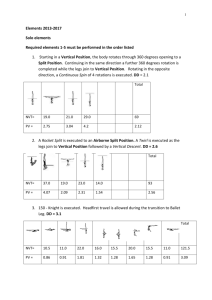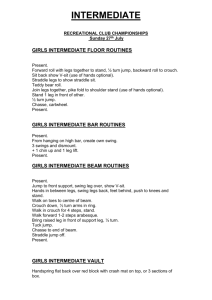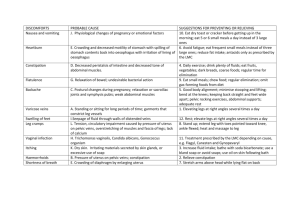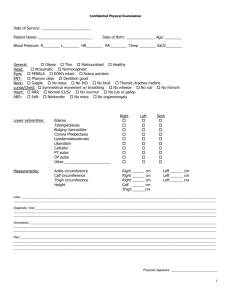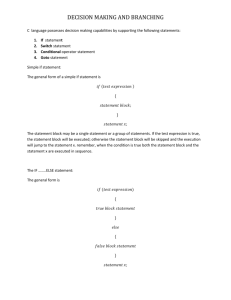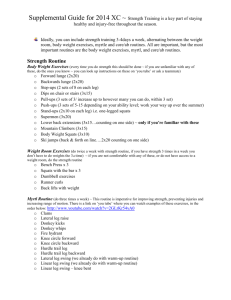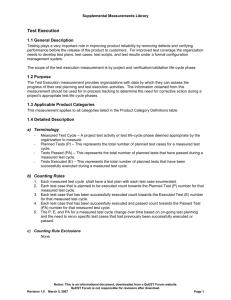INVITATION Brussels Open Masters synchronized swimming
advertisement
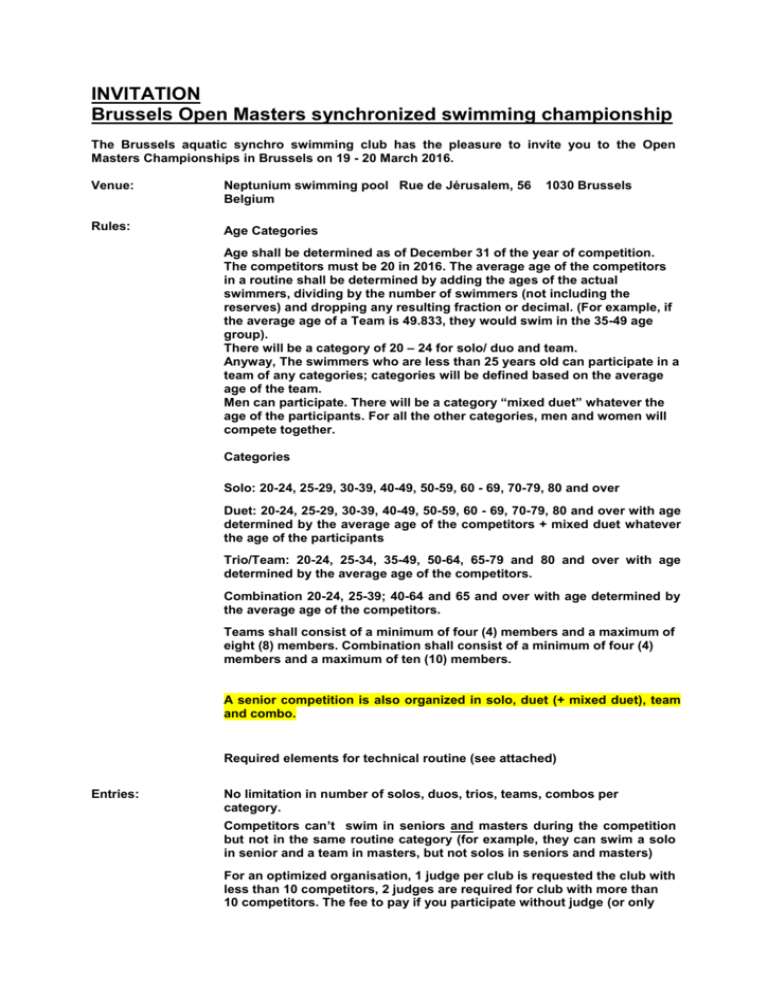
INVITATION Brussels Open Masters synchronized swimming championship The Brussels aquatic synchro swimming club has the pleasure to invite you to the Open Masters Championships in Brussels on 19 - 20 March 2016. Venue: Neptunium swimming pool Rue de Jérusalem, 56 Belgium Rules: Age Categories 1030 Brussels Age shall be determined as of December 31 of the year of competition. The competitors must be 20 in 2016. The average age of the competitors in a routine shall be determined by adding the ages of the actual swimmers, dividing by the number of swimmers (not including the reserves) and dropping any resulting fraction or decimal. (For example, if the average age of a Team is 49.833, they would swim in the 35-49 age group). There will be a category of 20 – 24 for solo/ duo and team. Anyway, The swimmers who are less than 25 years old can participate in a team of any categories; categories will be defined based on the average age of the team. Men can participate. There will be a category “mixed duet” whatever the age of the participants. For all the other categories, men and women will compete together. Categories Solo: 20-24, 25-29, 30-39, 40-49, 50-59, 60 - 69, 70-79, 80 and over Duet: 20-24, 25-29, 30-39, 40-49, 50-59, 60 - 69, 70-79, 80 and over with age determined by the average age of the competitors + mixed duet whatever the age of the participants Trio/Team: 20-24, 25-34, 35-49, 50-64, 65-79 and 80 and over with age determined by the average age of the competitors. Combination 20-24, 25-39; 40-64 and 65 and over with age determined by the average age of the competitors. Teams shall consist of a minimum of four (4) members and a maximum of eight (8) members. Combination shall consist of a minimum of four (4) members and a maximum of ten (10) members. A senior competition is also organized in solo, duet (+ mixed duet), team and combo. Required elements for technical routine (see attached) Entries: No limitation in number of solos, duos, trios, teams, combos per category. Competitors can’t swim in seniors and masters during the competition but not in the same routine category (for example, they can swim a solo in senior and a team in masters, but not solos in seniors and masters) For an optimized organisation, 1 judge per club is requested the club with less than 10 competitors, 2 judges are required for club with more than 10 competitors. The fee to pay if you participate without judge (or only one judge for more than 10 competitors) is 50 euros. The judges can swim too. Financial conditions: Travel and accommodation will be at the charge of the participating countries. Fees : 15 euros for solo 25 euros for duo and trio 10 euros per swimmer for team/combo 50 euros if the club has no judge Entry: Preliminary entry: 15 January 2016 Final entry: 1 March 2016 Please find enclosed a Preliminary Entry Form. Prel. Schedule: Saturday, 19th 08.00 – 09.00 09.00 – 10.30 10.30 – 11.00 11.30 – 15.00 15.00 – 16.30 16.30 – 18.00 18.00 – 18.30 19.00 – 20.00 20.00 Warming up Technical routines Team/Trio Warming up Technical routine – Solo/Duo Warming-up Free routine – Team/Trio Warming-up Free routine Solo (some categories) Ceremony Sunday, 20th 08.00 – 09.00 09.30 – 11.00 11.00 – 12.00 12.30 –14.00 14.30 – 17.00 17.30 Warming up Combo Ceremony and warming up Free routine – Solo (the other categories) Free routine – Duo Ceremony The schedule may be adapted based on the number of competitors. A more detailed schedule will be sent later. Meals: The BRASS club will propose sandwiches and others snacks during the whole competition. Information/ Registration: E-mail: fannybouvry@gmail.com Website: http://www.ebrass.be/ With kind regards, Fanny Bouvry Tel no: +32 477 75 88 82 E-mail: fannybouvry@gmail.com Required elements for masters technical routine Technical Routines: Solo – 1 minute 30 seconds Free Routines Solo – 2 minutes 30 seconds Technical Routines: Duet/Mixed Duet - 1 minute 40 seconds Free Routines: Duet/Mixed Duet - 3 minutes Technical Routines: Teams - 1 minute 50 seconds Free Routines: Teams - 4 minutes Free Combinations – 4 minutes 30 seconds There shall be no minimum time limit Maximum Time Limits: There shall be an allowance of fifteen (15) seconds plus the allotted time for Technical Routines, Free Routines and Combination. SOLO Elements 1 to 5 must be performed in the order listed. Elements 6 may be performed at any time during the routine 1. Fishtail – from a Front Layout Position, a Front Pike Position is assumed; one leg is lifted to a Fishtail position, the second leg is lifted to a Vertical Position (ending is optional). 2. Body boost – a rapid head-first rise, with a maximum of the body above the surface (arms optional). A descent is executed until the swimmer is completely submerged. 3. Barracuda Bent-Knee – from a Back Pike Position with legs perpendicular and with the toes just below the surface, a thrust is executed as one leg is drawn along the inside of the other extended legs to assume a Bent Knee Vertical Position. A vertical descent is executed in a Bent –Knee Vertical Position at the same tempo as the thrust. 4. Travelling Ballet-leg combination – Beginning in a Back Layout Position to include at least 2 of the following positions: Right Ballet-leg, Left Ballet-leg, Right Flamingo, Left Flamingo, Double Ballet-leg 5. Split Position followed by a walkout front or walkout back. 6. Two (2) forms of propulsion – must include Egg beater travelling sideways &/or forward (arms optional). DUO/TRIO/MIXED DUET Elements 1-5 must be performed in the order listed. Elements 6-7 may be performed at any time during the routine 1. Fishtail – from a Front Layout Position, a Front Pike Position is assumed; one leg is lifted to a Fishtail position, the second leg is lifted to a Vertical Position (ending is optional). 2. Body boost – a rapid head-first rise, with a maximum of the body above the surface (arms optional). A descent is executed until the swimmer is completely submerged. 3. Barracuda Bent-Knee – from a Back Pike Position with legs perpendicular and with the toes just below the surface, a thrust is executed as one leg is drawn along the inside of the other extended legs to assume a Bent Knee Vertical Position. A vertical descent is executed in a Bent –Knee Vertical Position at the same tempo as the thrust. 4. Travelling Ballet-leg combination – Beginning in a Back Layout Position to include at least 2 of the following positions: Right Ballet-leg, Left Ballet-leg, Right Flamingo, Left Flamingo, Double Ballet-leg 5. Split Position followed by a walkout front or walkout back. 6. Two (2) forms of propulsion – must include Egg beater travelling sideways &/or forward (arms optional). 7. Joined action – Where the swimmers are connected (touching) in some manner to perform one of the following: a. A connected figure or a connected float or connected stroking b. Action must be performed simultaneously. Mirror action is permitted c. Stacks, lifts, platforms, throws are not permitted. While the exception of the deck work and entry and as noted in the joined action, all elements, required and supplementary, MUST be performed simultaneously and facing same direction by all swimmers. Variation in propulsion and direction facing are permitted during pattern changes. TEAM Elements 1 - 5 must be performed in the order listed. Elements 6 - 9 may be performed at any time during the routine 1. Fishtail – from a Front Layout Position, a Front Pike Position is assumed; one leg is lifted to a Fishtail position, the second leg is lifted to a Vertical Position (ending is optional). 2. Body boost – a rapid head-first rise, with a maximum of the body above the surface (arms optional). A descent is executed until the swimmer is completely submerged. 3. Barracuda Bent-Knee – from a Back Pike Position with legs perpendicular and with the toes just below the surface, a thrust is executed as one leg is drawn along the inside of the other extended legs to assume a Bent Knee Vertical Position. A vertical descent is executed in a Bent –Knee Vertical Position at the same tempo as the thrust. 4. Travelling Ballet-leg combination – Beginning in a Back Layout Position to include at least 2 of the following positions: Right Ballet-leg, Left Ballet-leg, Right Flamingo, Left Flamingo, Double Ballet-leg 5. Split Position followed by a walkout front or walkout back. 6. Two (2) forms of propulsion – must include Egg beater travelling sideways &/or forward (arms optional). 7. Joined action – Where the swimmers are connected (touching) in some manner to perform one of the following: a. A connected figure or a connected float or connected stroking b. Action must be performed simultaneously. Mirror action is permitted c. Stacks, lifts, platforms, throws are not permitted. 8. Cadence actions - Identical movement(s) performed sequentially, one by one, by all team members. When more than one action is performed, they must be consecutive and not separated by other optional or required elements. A second cadence action may begin before the first cadence action is completed by all team members but each team member must do the action of each cadence. 9. Patterns – must show a circle and a straight line. Elements may be performed when in the circle or straight line patterns. While the exception of the deck work and entry and as noted in the joined action, all elements, required and supplementary, MUST be performed simultaneously and facing same direction by all swimmers. Variation in propulsion and direction facing are permitted during pattern changes. Mirrors actions are not permitted except as specified in the description of the elements. Required elements for seniors technical routine Technical Routine Solos: 2 minutes 00 seconds Free Routine Solos: 2 minutes 30 seconds Technical RoutineDuet/Mixed Duet: 2 minutes 20 seconds Free Routine Duet/Mixed Duet: 3 minutes 00 seconds Technical Routine Teams: 2 minutes 50 seconds Free Routine Teams 4 minutes 00 seconds Free Combination: 4 minutes 30 seconds There shall be an allowance of fifteen (15) seconds less or plus the allotted time for Technical Routines, Free Routines and Free Combination. GENERAL REQUIREMENTS Unless otherwise specified in the description of an element: • All figures or components thereof shall be executed according to the requirements described in appendices II-IV. • All elements shall be executed high and controlled, in uniform motion with each section clearly defined. SOLO REQUIRED ELEMENTS (A) Required elements 1 – 5 are to be performed in the order listed. 1. Starting in a Vertical Position, the body rotates through 360° opening to a Split Position. Continuing in the same direction a further 360° rotation is completed while the legs join to Vertical Position. Rotating in the opposite direction, a Continuous Spin of 1440° (4 rotations) is executed. [DD 2.1] 2. Starting in a submerged Back Pike Position with the legs vertical, a Rocket Split is executed to an Airborne Split Position. Maintaining maximum height a Twirl is executed as the legs join to Vertical Position followed by a rapid Vertical Descent. [DD 2.6] 3. 150 – A Knight is executed. Head first travel is allowed during the transition to the Ballet Leg. [DD 3.1] 4. Starting in a Vertical Position a Full Twist is executed followed by a Combined Spin of 1080° (3 rotations). [DD 2.4] 5. Starting in a submerged Back Pike Position with the legs vertical, 301e – a Barracuda Spinning 360° is executed. [DD 1.9] Duet/Mixed Duet REQUIRED ELEMENTS (A) Required elements 1 – 5 are to be performed in the order listed. 1. 436 – A Cyclone is executed to a Vertical Position. A Full Twist is executed as one leg lowers to a Bent Knee Vertical Position, followed by a Continuous Spin of 1080° (3 rotations) as the bent knee is joined to a Vertical Position. [DD 3.1] 2. From a Back Layout Position, travelling head first, one leg is lifted straight to a Ballet Leg Position. The horizontal leg is lifted to a Ballet Leg Double Position. Maintaining the Ballet Leg Double Position, a rotation of 360° is executed. The legs are held straight throughout the element. [DD 1.9] 3. Starting and maintaining a Fishtail Position, with the horizontal leg leading toward the vertical leg, 2 rapid rotations (720°) are executed. Continuing in the same direction, the horizontal leg is lifted to a Vertical Position as a Continuous Spin of 720° is executed. [DD 2.1] 4. Starting in a Front Pike Position, the legs are lifted to a Vertical Position. A Half Twist is executed followed by a further rotation of 180° with the legs opening to a Split Position. A Walkout Front is executed. [DD 2.8] 5. Starting in a submerged Back Pike Position with the legs vertical, 301c – a Barracuda Twirl is executed. [DD 2.4] 6. The routine must contain a lift or throw, this can be placed anywhere in the routine. 7. With the exception of the deck work, entry and the lift or throw, all elements required and supplementary must be performed simultaneously and facing the same direction. Mirror actions are not permitted. TEAM REQUIRED ELEMENTS (A) Required elements 1 – 5 are to be performed in the order listed. 1. Starting in a submerged Back Pike Position with the legs vertical, 301 – a Barracuda is executed. [DD 1.8] 2. 435 – A Nova is executed to the Bent Knee Surface Arch Position. A rotation of 360° is executed as the legs are lifted to a Vertical Position followed by a Continuous Spin of 720° (2 rotations). [DD 2.4] 3. Starting in a Front Pike Position, the legs are lifted to a Vertical Position. A Full Twist is executed, the legs are lowered to a Split Position. A Walkout Front is executed. [DD 2.9] 4. Starting in a submerged Back Pike Position with the legs vertical, 308 – a Barracuda Airborne Split is executed. [DD 2.5] 5. Travelling Ballet Leg Sequence. Starting in a Back Layout Position travelling head first, a Ballet Leg is assumed, the horizontal leg bends to a Flamingo Position and is then lifted to a Ballet Leg Double Position. [DD 1.7] 6. The routine must contain one head first throw and a Cadence Action with either arms or legs. These may be placed anywhere in the routine. 7. With exception of the deck work, entry, the throw and the Cadence Action, all elements – required and supplementary – must be performed simultaneously and facing the same direction by all team members. Variations in propulsion and direction facing are permitted only during pattern changes and underwater actions. Mirror actions are not permitted.
